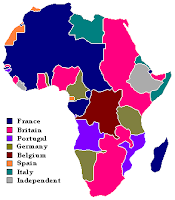During World War II many Africans joined in the battle against the axis, in particular the Italians led by Mussolini. Many of these Africans were from South Africa and were part of the South African Army. The South African Army consists of several branches including at least three Infantry Divisions and at least one armoured divisions.
Most of this membership came from alliance with British governments that colonized the area whether or not this was a happy cooperation or not remains a question due to political division within South Africa to honor the Pact of alliance with Britain or remain neutral. While they played important roles many Africans were denied high ranking positions or high profile missions due to the color of their skin. Thus for the most part people not of European descent were given largely domestic issues.
While Africa did not really need to be involved in WWII they were because of the colonization of the continent by European powers. So when European countries were attacked, their enemies also would target African colonies. There were significant losses of life for native Africans though, especially considering this was not a popular war in the eyes of the native Africans. Death numbers reached 77,000 for blacks and 46,000 for Asians and "colored."











